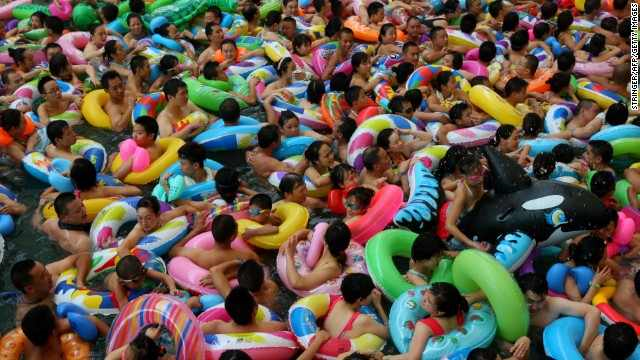Heat wave kills people, crops, fish, and hopes in China
By Jethro Mullen
1 August 2013 Hong Kong (CNN) – Record-breaking temperatures have been searing large swaths of China, resulting in dozens of heat-related deaths and prompting authorities to issue a national alert. People are packing into swimming pools or taking refuge in caves in their attempts to escape the fierce temperatures. Local governments are resorting to cloud-seeding technology to try to bring rain to millions of acres of parched farmland. The worst of the smoldering heat wave has been concentrated in the south and east of the country, with the commercial metropolis of Shanghai experiencing its hottest July in at least 140 years, according to state media. Temperatures in the sprawling city of 23 million inhabitants reached 35 degrees Celsius (95 degrees Fahrenheit) or higher on 25 days in July, the state-run news agency Xinhua reported Wednesday. More than 10 people died from heatstroke in Shanghai during the month, it said. But the brutal temperatures aren’t confined to the Shanghai region. “About 19 provinces and regions are experiencing scorching heat, covering more than 3 million square kilometers, almost a third of the country,” He Lifu, chief weather forecaster at the National Meteorological Center, told the English-language newspaper China Daily. The China Meteorological Administration issued its second-highest national heat alert on Tuesday, China Daily reported, adding that the highest alert has never been used. Photos carried by state media showed people frying food like eggs, shrimp and bacon in pans placed on the road surface in some cities. In Shanghai, the heat was being blamed for mounting numbers of dead fish in ponds and rivers, reported Shanghai Daily, an English-language newspaper. Some of the highest temperatures were clocked in and around the eastern city of Hangzhou, about 100 kilometers southwest of Shanghai. The thermometer went above 40 degrees Celsius (104 degrees Fahrenheit) in Hangzhou on six out of seven days in the past week, state media reported. In the district of Xiaoshan, it reached 42.2 degrees Celsius (about 108 Fahrenheit) on Tuesday, the highest temperature recorded for the area. Seven cities and counties in the surrounding province of Zhejiang used cloud-seeding techniques on Tuesday to bring rain to drought-hit farmland, China Daily said. [more]
People, crops and fish suffer in China heat wave 
By WANG QIAN and ZHAO KAI
31 July 2013 (China Daily) – Wang Enda knows his harvest this year will be meager. The 58-year-old farmer in Haohuahong, a village in Guizhou province, sowed tens of thousands of corn seeds on his hectare of land in spring, but only a third of them sprouted due to the severe drought. What is worse is that all his hot peppers and grapes, which were supposed to bring him handsome returns, withered amid the drought that is sweeping through at least nine provinces and regions. “I’m not looking forward to the harvest,” Wang said with a sigh, adding that his crop may be reduced by almost 70 percent. Millions of farmers in the south of the country are struggling with the dry spell. The China Meteorological Administration issued a national second-level heat alert on Tuesday, the highest alert in the country’s history. The alert system has four levels. The administration said temperatures in southern China will surpass 35 C from Tuesday to Aug 8, with some places expected to see the mercury hit record highs. The searing heat wave has killed several people since the end of June and forecasters suggested people avoid extended outdoor activities. Minhang District Hospital in Shanghai treated four people suffering severe heat-related illnesses in the past week, with two dying of severe heat stroke. A 36-year-old construction worker and an 84-year-old man were also found dead due to the extreme heat in Changsha, the provincial capital of Hunan, on Sunday and Monday. Since July 1, local emergency and rescue centers have received more than 200 emergency calls reporting heat-related illnesses. Tian Zheng, a doctor at a hospital under Hunan University of Chinese Medicine, suggested people drink more water and not set air conditioners at too low a temperature. Yao Rong, a weather forecaster in Hunan, said temperatures may reach 41 C this week. About 653,000 hectares of farmland had been affected by the drought in Hunan as of Sunday. One million people were short of drinking water. The provincial government said the dry spell may continue for the next two months. Yao, the weather forecaster, said efforts to induce rainfall, such as seeding clouds, have been made. In Hangzhou, the capital of Zhejiang province, the summer heat has boosted power consumption. On Tuesday, the city’s electricity power distribution committee raised the measure of electricity usage to level F, the highest level. Yang Yong, an official with the Hangzhou branch of the Zhejiang Electronic Power Company, said, “Scenic lighting will be turned off, and high electricity-consuming factories are required to stop production for at least three days a week.” [more]
